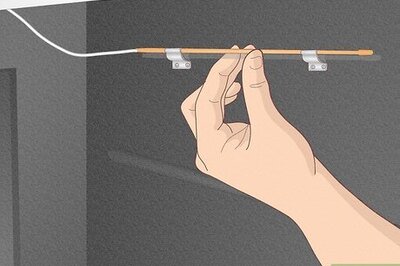
views
Paris: France's controversial ban on wearing Islamic veils such as burqas and niqabs takes effect on Monday.
A silent protest march against the burqa ban is planned for Monday morning in Paris.
The ban pertains to the burqa, a full-body covering that includes a mesh over the face, and the niqab, a full-face veil that leaves an opening only for the eyes.
The hijab, which covers the hair and neck but not the face, and the chador, which covers the body but not the face, apparently are not banned by the law.
"The ban does not target the wearing of a headscarf, head-gear, scarf or glasses, as long as the accessories do not prevent the person from being identified," the Interior Ministry said in a statement
French Prime Minister Francois Fillon last month defended the ban as being in keeping with national values.
"The French Republic lives in a bare-headed fashion," he said in an official government newspaper explaining the law.
The law imposes a fine of 150 euros ($190). The person breaking the law can be asked to carry out public service duty as part of the punishment or as an alternative to the fine.
The law was passed in October but included a six-month period to inform people of the penalty before it went into effect.
Penalties for forcing a person to wear a burqa are part of the law, and they became effective immediately in October.
Forcing a woman to wear a niqab or a burqa is punishable by a year in prison and a 30,000 euro fine (about $43,400). Forcing a minor to do the same thing is punishable by two years in prison and a fine of 60,000 euros.
The government has called this coercion "a new form of enslavement that the republic cannot accept on its soil."
The practice has sparked a debate over religious freedom.
The French Constitutional Council said the law did not impose disproportionate punishments or prevent the free exercise of religion in a place of worship, finding therefore that "the law conforms to the Constitution."
"Given the damage it produces on those rules which allow the life in community, ensure the dignity of the person and equality between sexes, this practice, even if it is voluntary, cannot be tolerated in any public place," the French government said when it sent the measure to parliament in May of last year.
Lawmakers have also cited security reasons for forbidding people from covering their faces in public.
French people backed the ban by a margin of more than four to one, the Pew Global Attitudes Project found in a survey last year.
Some 82 per cent of people polled approved of a ban, while 17 per cent disapproved. That was the widest support the Washington-based think tank found in any of the five countries it surveyed.
Clear majorities also backed burqa bans in Germany, Britain and Spain, while two out of three Americans opposed it, the survey found.
Amnesty International had repeatedly urged France not to impose the ban, saying it violates European human rights law.




















Comments
0 comment